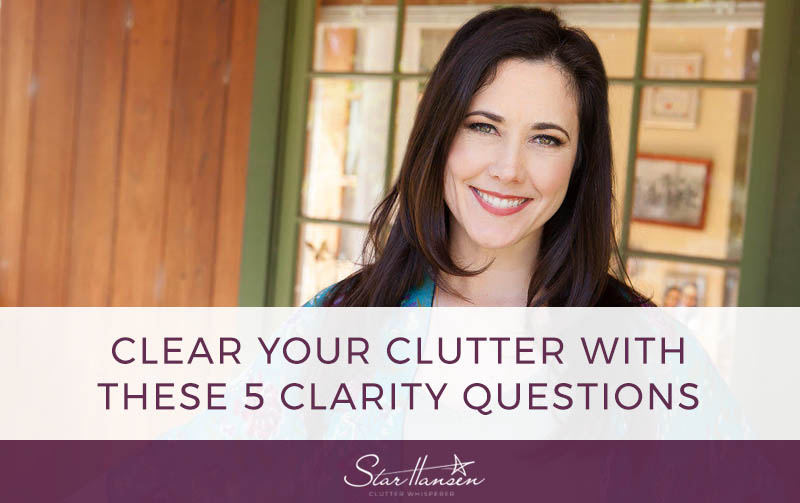Clarity questions can help you clear clutter.
Believe it or not, clutter is not the villain we often make it out to be. Clutter can actually be a useful tool in helping you uncover the deep-rooted emotional baggage you’ve been carrying around for some time.
Clutter speaks–we just don’t necessarily want to hear (or maybe we’re not yet ready to hear) what it has to say. When you listen, I mean really listen to what your clutter has to say to you, it invites you to acknowledge the complex feelings tied to your clutter. It’s hard but so worth the reward that awaits on the other side of your stuff–I promise.
I’d like to invite you to ask yourself 5 questions that will help you clarify what your clutter is saying to you.
They’re simple, but not easy. Grab your favorite notebook or fire up your laptop so you can record your answers. Take a deep breath, and let’s bravely tackle them one at a time.
Clutter Clarity Question 1–WHO’s my who?
Who you share space with is hugely important. You are mixing energy here and whether you see it or not, there is silent, non-verbal communication happening all the time. So the question to ask yourself is, who do I share this space with? How do you feel about this person or persons?
Be real. Don’t sugarcoat it.
You can love your husband and also want to banish him to a desert island to live forever without you because of the way he slurps down his morning Starbucks. Both can exist at the same time. And the sooner you are able to hold space for the duality, the faster you can be honest with yourself and see what’s really going on. Both at this moment and long term.
Clutter Clarity Question 2–WHAT kind of clutter do I have?
Now we’re onto the next phase of hearing your clutter. So let’s talk to the clutter itself. Take a moment and look around your space. What is there? No need to do an inventory, just a basic overview. What are the general categories of your clutter? For example, paperwork, unused kitchen appliances, clothing, etc. Most rooms only have between 3-20 categories of clutter.
That is far less panic-inducing than trying to look at each individual object. When we start to see clutter in categories instead of individual items, the fog of overwhelm starts to go away and we can focus in more powerful ways.
Clutter Clarity Question 3–WHY is this clutter here?
Now that you know what type of clutter you’re working with, I want you to explore why it is there. No reason is too small. Let yourself fully explain the situation according to your truth. Do you have a counter full of mail because it’s just not fun to go through? Or because you think you’re too “lazy?” Or maybe it stresses you out to no end to open bills you don’t want to or can’t pay. Or maybe you just like the look of a full counter instead of an empty one.
What is really going on here? Name it. Write it down. Why is it here?
Clutter Clarity Question 4–HOW do I feel about this clutter?
Let’s get to the good stuff. How do you feel about the clutter that’s sitting here? More importantly, how do you feel about yourself because this clutter is sitting here? Be brave, be real and own it. Do you feel shame? Are you feeling exhausted? Do you feel terrified? Do you feel bored? Anxious? Nervous? What is your real deal with this stuff? What do you think it means about you?
This can be a challenging thing to admit but this is where the magic happens. From this space, we can start to see what’s really going on. We can’t get past our clutter if we can’t name it. Take a minute now and write down how you truly feel about this clutter.
Clutter Clarity Question 5–HOW is my clutter helping me?
Armed with this treasure trove of information, you are ready to tackle the most important question yet–the game-changer. How is your clutter helping you? That feeling we just talked about is helping you in some way. I know it sounds crazy. I mean, how can shame help you? But it does. Your shame or fear or guilt are often acting as tools in service to your highest good and greatest safety.
Let’s say you feel shame in a space. Perhaps you feel shame that you don’t have it more together or shame that there’s something wrong with you. Dig into that feeling. How is that shame helping you? Does shame motivate you to be more effective? Is it giving you a much-needed break after decades of hard work? The clutter is acting in service to the shame in some way, and the shame is acting in service to you.
It’s not a villain, it’s a helper.
How is your clutter helping you achieve that feeling? And how does that serve you in some deeper way? Take a few minutes to write this down. If you are still feeling anxious about this click here to watch how I deal with anxiety.
Armed with these 5 answers to these clarity questions you have the insight to see how your clutter is helping you. You can start to make choices to meet those needs in a way that doesn’t involve clutter. Once your true need is met, the clutter has a way of falling away with ease. It’s a freeing feeling to uncover your truth and begin to heal the deeper cause of the clutter. Bravo! Here is an article I shared about how to build your decluttering toolbox.
I know that may have been an intense dig. Thank you for staying with me through it. Remember, you’re not alone in your journey toward a clutter-free life. You have a partner in me. Please share your insights with me in the comment section below.




